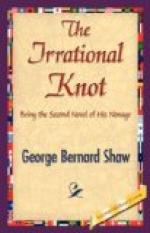CHAPTER XVI
One Saturday afternoon in December Marian and Elinor sat drinking tea in the drawing-room at Holland Park. Elinor was present as an afternoon caller: she no longer resided with the Conollys. Marian had been lamely excusing herself for not having read Elinor’s last book.
“Pray dont apologize,” said Elinor. “I remember the time when you would have forced yourself to read it from a sense of duty; and I am too delighted to find that nonsense washing out of you at last to feel the wound to my vanity. Oh, say no more, my dear you can read it still whenever you please. Brother George read it, and was shocked because the heroine loves the villain and tells him so without waiting to be asked. It is odd that long ago, when I believed so devoutly in the tender passion, I never could write a really flaming love story.”
“Dont begin to talk like that,” said Marian, crossly. “People do fall in love, fortunately for them. It may be injudicious; and it may turn out badly; but it fills up life in a way that all the barren philosophy and cynicism on earth cannot. Do you think I would not rather have to regret a lost love than to repine because I had been too cautious to love at all? The disappointments of love warm the heart more than the triumphs of insensibility.”
“Thats rather a good sentence,” said Elinor. “Your talk is more classical than my writing. But what would the departed Marian Lind have said?”
“The departed Marian Lind was so desperately wise that she neglected that excellent precept, ’Be not righteous over much, neither make thyself over wise; why shouldest thou destroy thyself?’ I took up the Bible last night for the first time since my marriage; and I thought what fools we two used to be when we made up our minds to avoid all the mistakes and follies and feelings of other people, and to be quite superior and rational. ’He that observeth the wind shall not sow; and he that regardeth the clouds shall not reap.’ It is all so true, in spite of what Ned says. We were very clever at observing the wind and regarding the clouds; and what are we the better for it? How much irreparable mischief, I wonder, did we do ourselves by letting our little wisdoms stifle all our big instincts! Look at those very other people whom we despised; how happy they are, in spite of their having always done exactly what their hearts told them!”
“I think we are pretty well off as people go. I know I am. Certainly it was part of our wisdom that marriage was a bad thing; and I grant that though you married in obedience to your instincts you are as well off as I. But I dont see that we are the worse for having thought a little.”
“I did not marry in obedience to my instincts, Nelly; and you know it. I made a disinterested marriage with a man whom I felt I could respect as my superior. I was convinced then that a grand passion was a folly.”




